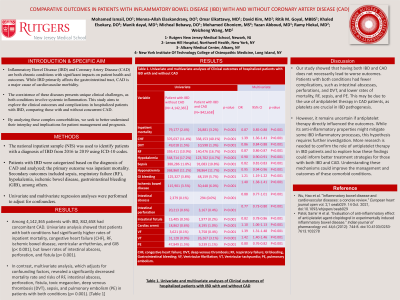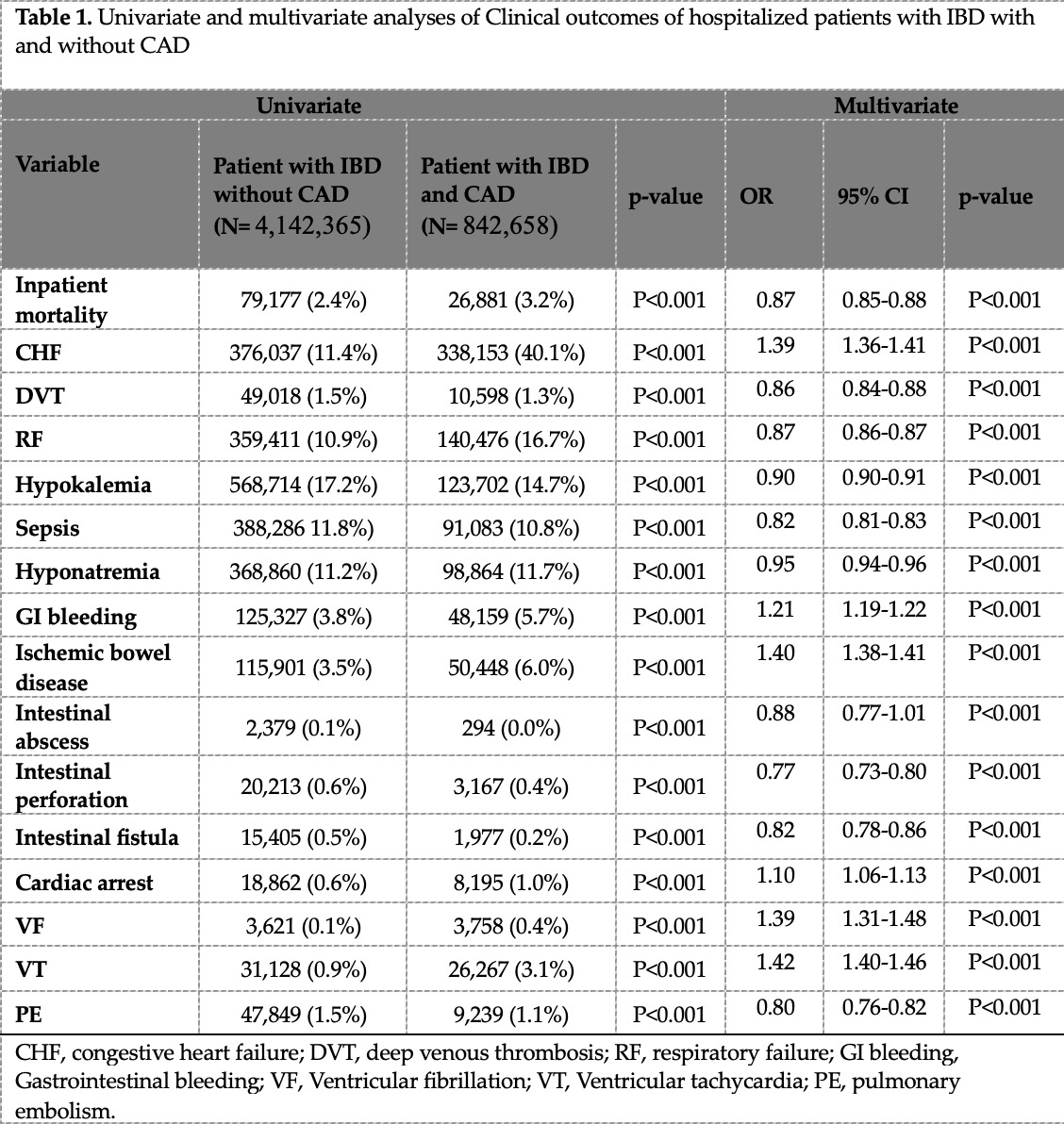Tuesday Poster Session
Category: IBD
P4269 - Comparative Outcomes in Patients With Inflammatory Bowel Disease (IBD) With and Without Coronary Artery Disease (CAD)
Tuesday, October 29, 2024
10:30 AM - 4:00 PM ET
Location: Exhibit Hall E

Has Audio
- MI
Mohamed Ismail, DO
Rutgers New Jersey Medical School, NJ
Presenting Author(s)
Mohamed Ismail, DO1, Menna-Allah Elaskandrany, DO2, Omar Elkattawy, MD1, David Kim, MD1, Ritik M. Goyal, MBBS1, Khaled Elsokary, DO3, Manik dayal, MD1, Micheal Bebawy, DO1, Mohamed Ghoniem, MS4, Yazan Abboud, MD1, Ramy Hiekal, MD2, Weizheng Wang, MD1
1Rutgers New Jersey Medical School, Newark, NJ; 2Lenox Hill Hospital, Northwell Health, Astoria, NY; 3Albany Medical Center, Albany, NY; 4New York Institute of Technology College of Osteopathic Medicine, Roslyn, NY
Introduction: This study focuses on the clinical outcomes and comorbidities in hospitalized patients with Inflammatory Bowel Disease (IBD), comparing those with and without concurrent coronary artery disease (CAD). Our study aims to understand the complexities and risks associated with these coexisting conditions.
Methods: The National Inpatient Sample (NIS) was used to identify patients diagnosed with IBD from 2016 to 2019 using ICD-10 codes. Patients with IBD were categorized based on the diagnosis of CAD. The primary outcome was inpatient mortality, while secondary outcomes included sepsis, respiratory failure (RF), hypokalemia, ischemic bowel disease, and gastrointestinal bleeding (GIB). Univariate and multivariate regression analyses were performed to adjust for confounders.
Results: Among 4,142,365 patients with IBD, 842,658 had concomitant CAD. Univariate analysis showed that patients with both conditions had significantly higher rates of inpatient mortality, congestive heart failure (CHF), RF, ischemic bowel disease, ventricular arrhythmias, and GIB (p< 0.001), but lower rates of intestinal abscess, perforation, and fistula (p< 0.001).
In contrast, multivariate analysis, which adjusts for confounding factors, revealed a significantly decreased mortality rate and risks of RF, intestinal abscess, perforation, fistula, toxic megacolon, deep venous thrombosis (DVT), sepsis, and pulmonary embolism (PE) in patients with both conditions (p< 0.001). [Table 1]
Discussion: Our study showed that having both IBD and CAD does not necessarily lead to worse outcomes. Patients with both conditions had fewer complications, such as intestinal abscesses, perforations, and DVT, and lower rates of mortality, RF, sepsis, and PE. This may be due to the use of antiplatelet therapy in CAD patients, as platelets are crucial in IBD pathogenesis. However, it remains uncertain if antiplatelet therapy directly influenced the outcomes. While its anti-inflammatory properties might mitigate some IBD inflammatory processes, this hypothesis requires further investigation. More research is needed to confirm the role of antiplatelet therapy in IBD patients and to explore how these findings could inform better treatment strategies for those with both IBD and CAD. Understanding these mechanisms could improve the management and outcomes of these comorbid conditions.

Note: The table for this abstract can be viewed in the ePoster Gallery section of the ACG 2024 ePoster Site or in The American Journal of Gastroenterology's abstract supplement issue, both of which will be available starting October 27, 2024.
Disclosures:
Mohamed Ismail, DO1, Menna-Allah Elaskandrany, DO2, Omar Elkattawy, MD1, David Kim, MD1, Ritik M. Goyal, MBBS1, Khaled Elsokary, DO3, Manik dayal, MD1, Micheal Bebawy, DO1, Mohamed Ghoniem, MS4, Yazan Abboud, MD1, Ramy Hiekal, MD2, Weizheng Wang, MD1. P4269 - Comparative Outcomes in Patients With Inflammatory Bowel Disease (IBD) With and Without Coronary Artery Disease (CAD), ACG 2024 Annual Scientific Meeting Abstracts. Philadelphia, PA: American College of Gastroenterology.
1Rutgers New Jersey Medical School, Newark, NJ; 2Lenox Hill Hospital, Northwell Health, Astoria, NY; 3Albany Medical Center, Albany, NY; 4New York Institute of Technology College of Osteopathic Medicine, Roslyn, NY
Introduction: This study focuses on the clinical outcomes and comorbidities in hospitalized patients with Inflammatory Bowel Disease (IBD), comparing those with and without concurrent coronary artery disease (CAD). Our study aims to understand the complexities and risks associated with these coexisting conditions.
Methods: The National Inpatient Sample (NIS) was used to identify patients diagnosed with IBD from 2016 to 2019 using ICD-10 codes. Patients with IBD were categorized based on the diagnosis of CAD. The primary outcome was inpatient mortality, while secondary outcomes included sepsis, respiratory failure (RF), hypokalemia, ischemic bowel disease, and gastrointestinal bleeding (GIB). Univariate and multivariate regression analyses were performed to adjust for confounders.
Results: Among 4,142,365 patients with IBD, 842,658 had concomitant CAD. Univariate analysis showed that patients with both conditions had significantly higher rates of inpatient mortality, congestive heart failure (CHF), RF, ischemic bowel disease, ventricular arrhythmias, and GIB (p< 0.001), but lower rates of intestinal abscess, perforation, and fistula (p< 0.001).
In contrast, multivariate analysis, which adjusts for confounding factors, revealed a significantly decreased mortality rate and risks of RF, intestinal abscess, perforation, fistula, toxic megacolon, deep venous thrombosis (DVT), sepsis, and pulmonary embolism (PE) in patients with both conditions (p< 0.001). [Table 1]
Discussion: Our study showed that having both IBD and CAD does not necessarily lead to worse outcomes. Patients with both conditions had fewer complications, such as intestinal abscesses, perforations, and DVT, and lower rates of mortality, RF, sepsis, and PE. This may be due to the use of antiplatelet therapy in CAD patients, as platelets are crucial in IBD pathogenesis. However, it remains uncertain if antiplatelet therapy directly influenced the outcomes. While its anti-inflammatory properties might mitigate some IBD inflammatory processes, this hypothesis requires further investigation. More research is needed to confirm the role of antiplatelet therapy in IBD patients and to explore how these findings could inform better treatment strategies for those with both IBD and CAD. Understanding these mechanisms could improve the management and outcomes of these comorbid conditions.

Figure: Table 1. Univariate and multivariate analyses of Clinical outcomes of hospitalized patients with IBD with and without CAD
Note: The table for this abstract can be viewed in the ePoster Gallery section of the ACG 2024 ePoster Site or in The American Journal of Gastroenterology's abstract supplement issue, both of which will be available starting October 27, 2024.
Disclosures:
Mohamed Ismail indicated no relevant financial relationships.
Menna-Allah Elaskandrany indicated no relevant financial relationships.
Omar Elkattawy indicated no relevant financial relationships.
David Kim indicated no relevant financial relationships.
Ritik Goyal indicated no relevant financial relationships.
Khaled Elsokary indicated no relevant financial relationships.
Manik dayal indicated no relevant financial relationships.
Micheal Bebawy indicated no relevant financial relationships.
Mohamed Ghoniem indicated no relevant financial relationships.
Yazan Abboud indicated no relevant financial relationships.
Ramy Hiekal indicated no relevant financial relationships.
Weizheng Wang indicated no relevant financial relationships.
Mohamed Ismail, DO1, Menna-Allah Elaskandrany, DO2, Omar Elkattawy, MD1, David Kim, MD1, Ritik M. Goyal, MBBS1, Khaled Elsokary, DO3, Manik dayal, MD1, Micheal Bebawy, DO1, Mohamed Ghoniem, MS4, Yazan Abboud, MD1, Ramy Hiekal, MD2, Weizheng Wang, MD1. P4269 - Comparative Outcomes in Patients With Inflammatory Bowel Disease (IBD) With and Without Coronary Artery Disease (CAD), ACG 2024 Annual Scientific Meeting Abstracts. Philadelphia, PA: American College of Gastroenterology.
